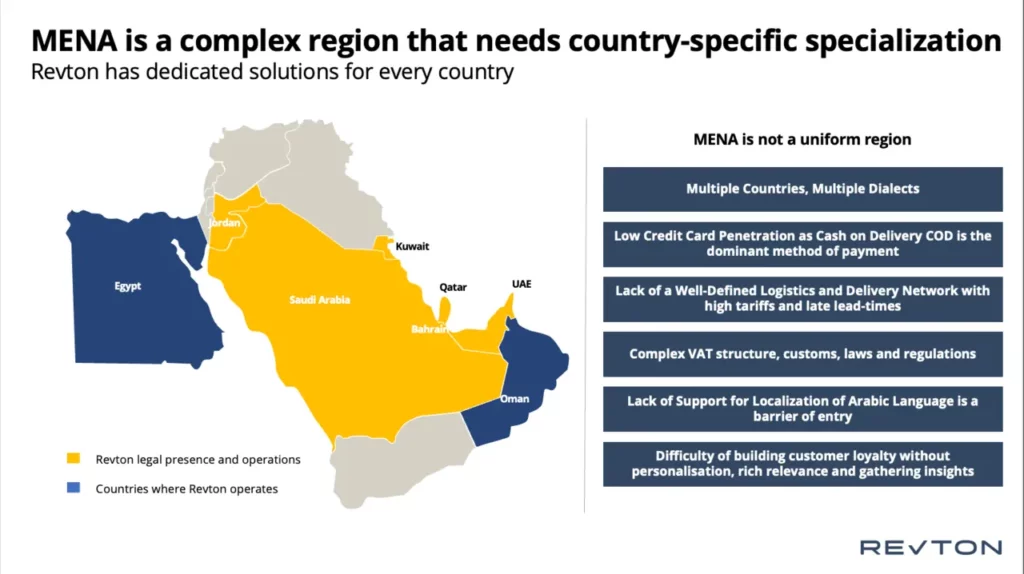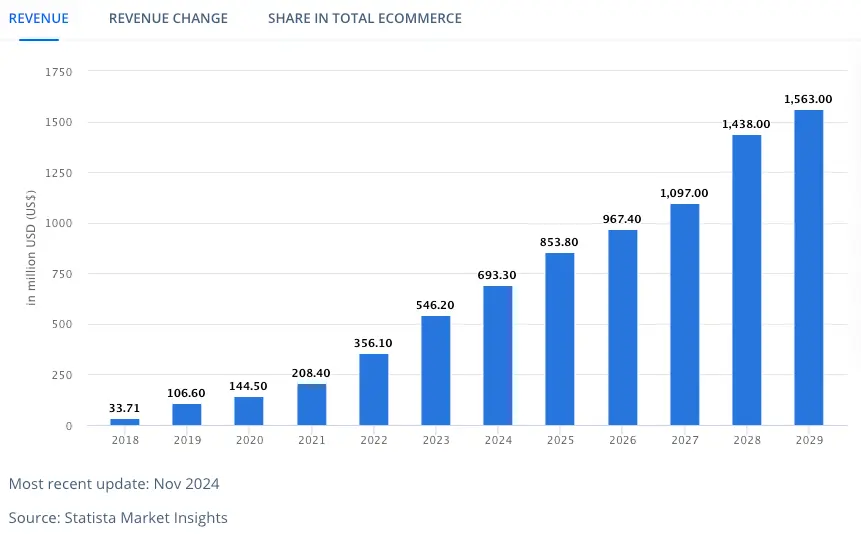Expanding e-commerce in the Middle East and North Africa
- Expanding e-commerce in the Middle East and North Africa
- Launching a successful fashion e-commerce in Middle East and North Africa.
- How does the fashion e-commerce market in MENA compare to global markets?
- MENA Market Nuances and Localization aspects:
- MENA Logistics and Customer Expectations:
- Success Factors for the MENA region:
- The Approach with a local ecommerce and digital marketing partner such as Revton:
- What localization factors impact Middle East e-commerce?
- What benefits does cash-on-delivery payment provide?
- Social Commerce in the Mena
- How does Revton's localisation process benefit businesses?
- What is Revton
- Key facts about ecommerce in the Middle East
- Middle East Customers' Preferred Shopping Channels:
- Middle East Fashion News
Launching a successful fashion e-commerce in Middle East and North Africa.

The Middle East in the MENA region represents a great opportunity for European fashion brands. The Middle East e-commerce market is experiencing strong growth in population, in particular young people who are connected to the internet.
The e-commerce customers in MENA e-commerce quite often tend to purchase directly from official websites of the fashion brands, in order to ensure authenticity of the products.
Customers in MENA e-commerce often prefer purchasing directly from brand websites to ensure authenticity. However, the success of e-commerce in the Middle East depends on adapting to regional market specifics, such as:
- Cultural adaptation of content and commercial calendar
- Activation of local payment methods including alternative payment methods in MENA like Cash-On-Delivery
How does the fashion e-commerce market in MENA compare to global markets?
The MENA (Middle East and North Africa) region presents a unique and rapidly growing e-commerce market with distinct characteristics compared to global markets.
Growth and Potential:
- The e-commerce in the Middle East sector has grown an average rate of 35% year-over-year since 2019, with revenue projected to reach $110 billion by 2025 and $159.3 billion by 2029 (Statista).
- Luxury retailers alone generated over $1.2 billion in 2021 in the Middle East e-commerce market. To thrive in this region, brands must implement effective digital marketing strategies for the MENA region, ensuring a localized approach that meets consumer expectations and shopping behaviors.
- The Gulf Cooperation Countries (GCC) are particularly attractive due to their young, tech-savvy population with high disposable incomes and high internet and smartphone penetration rates.

MENA Market Nuances and Localization aspects:
- The MENA e-commerce region consists of 22 countries with different cultures and consumer behaviours, so it cannot be treated as a single, uniform market.
- Success in the Middle East e-commerce market requires country-specific specialization in language, personalization, and commercial campaigns.
- The region uses Arabic, a right-to-left language, requiring specific adaptations.
- Marketing channel mix is different; for example, Snapchat is a high-performing channel in Kuwait, Saudi Arabia, and Qatar, unlike in many other regions.
- Commercial events include international events like Black Friday (referred to as White Friday) and local events like Saudi National Day and Eid.
- Translation needs to be human-based rather than using simple tools like Google Translate.
- Customer service requires local landlines and Arabic-speaking agents.
- E-commerce platforms need to support right-to-left languages, multiple currencies, and inventory locations.
- Alternative payment methods in MENA are crucial for e-commerce success. Alternative pament methods include: KNET (Kuwait), Mada and Sadad (Saudi Arabia), Benefit Payment (Bahrain), and Cash-On Delivery.
- It is important to consider what products can pass the border and what is considered forbidden.
- The e-commerce Middle East market requires businesses to naviagte customs, product restrictions, and varying tax regulations, such as VAT and clearance duties.
MENA Logistics and Customer Expectations:
- The Middle East presents country-specific logistics challenges.
- An undeveloped address system requires specific solutions for delivery.
- Cash on delivery (COD) is still a popular payment method in the region. Approximately 60% of online purchases are completed using COD.
- Offering COD can present challenges such as high cancellation rates.
- Customers are highly dependent on customer care and expect support through various channels.
- 90% of social media communication is in Arabic.
- A smooth and easy return process with full visibility is essential.
Success Factors for the MENA region:
- To succeed in the Middle East e-commerce market, businesses need a partner with local knowledge and expertise.
- Arabic localised content, culturally localised marketing content, and customer service are crucial for e-commerce in the Middle East.
- A deep understanding of cultural nuances and consumer behaviour is essential for growth in the MENA e-commerce sector.
- Adapting the commercial and marketing calendar to the regional festivities – when most online sales happen – is a key startegy in the e-commerce Middle East landscape.
The Approach with a local ecommerce and digital marketing partner such as Revton:
- Revton builds, develops, and operates e-commerce businesses in the MENA region for global retailers.
- They offer an end-to-end solution for cross-border growth in the Middle East e-commerce market.
- Services of e-commerce in the Middle East include: establishing a digital experience, localising the value chain, optimising marketing, and managing logistics.
- Revton provides effective digital marketing strategies for the MENA region, ensuring country-specific marketing and audience engagement.
- Revton offers a performance-based working model with commission on revenues generated for the client.
What localization factors impact Middle East e-commerce?
Several localization factors significantly impact e-commerce in the Middle East. These factors encompass marketing, merchandising, translation, customer service, platform considerations, and payment methods. The sources highlight the importance of country-specific specialisation due to the region’s diverse cultures and consumer behaviours.
Key localization factors include:
- Marketing: Marketing messages and channel mix should be localized. For example, while Snapchat may not be a top-performing channel in other regions, it is highly effective in Kuwait, Saudi Arabia, and Qatar.
- Merchandising: Commercial events should include both international events, such as White Friday (the Middle Eastern equivalent of Black Friday), and local events, such as Saudi National Day and Eid.
- Translation: Translation should be human-based and culturally relevant, avoiding literal translations from tools like Google Translate. The Arabic language is used in the Middle East, which is written from right to left.
- Customer Service: Businesses in the Middle East e-commerce market should offer local alndlines and Arabic-speaking agents, as strong cusotmer care is a regional priority.
- Platform: E-commerce MENA platforms need to support right-to-left languages, multiple currencies, and multi-warehouse management.
- Payment Methods: Providing alternative payment methods in MENA ss crucial, including: KNET (Kuwait), Mada and Sadad (Saudi Arabia), and Benefit Payment (Bahrain). Cash-On delivery is also a very common payment method.
- Logistics: Logistics needs to account for country-specific challenges and undeveloped address systems.
- Content: Creatives and content should be tailored to the region, ensuring they resonate with the local audience.
- Legal and cultural: Consider what products can pass the border and what is considered forbidden.
- Pricing: Implement a pricing structure that localizes pricing for each country, incorporating duties and taxes to avoid hidden costs for the customer at checkout.
These localization elements are crucial for brands and retailers aiming to penetrate the Middle Eastern market effectively. Revton offers these services to enable localization at its core.
In conclusion, while the MENA region offers significant e-commerce growth opportunities, its unique characteristics require a tailored approach that considers cultural nuances, local preferences, and logistical challenges. Partnering with local experts and adapting strategies to the specific needs of the MENA market are crucial for success.
What benefits does cash-on-delivery payment provide?
Cash-on-delivery (COD) is one of the most widely used payment options in the Middle East e-commerce market, offering significant advantages.
Key benefits of cash-on-delivery:
- Market Relevance: COD is a widely used payment method in the MENA region, with as much as 60% of online purchases being paid for in cash upon delivery.
- Building Trust: COD can help build trust with customers who may be hesitant to use other payment methods initially. By allowing customers to pay only when they receive the order, it reduces perceived risk and encourages first-time purchases.
- Customer Preference: Many customers in the MENA region prefer COD due to cultural norms and a preference for tangible transactions.
- Accessibility: COD provides access to e-commerce for individuals who may not have credit cards or bank accounts, thus expanding the potential customer base.
- Increased Conversion Rates: Offering COD can lead to higher conversion rates as it caters to the payment preferences of a significant portion of the population.
While COD presents opportunities, it also has challenges, including potential for higher cancellation rates and the need for efficient logistics to manage cash collection and returns.
Social Commerce in the Mena
Social Commerce is also gaining increasing shares of the total e-commerce market in the MENA region, contributing to the further growth of the ecommerce market. Social Media users and platforms aim a keeping the users on-platform as much as possible.

How does Revton’s localisation process benefit businesses?
Revton’s localisation process offers several benefits to businesses aiming to expand into the Middle East e-commerce market, addressing the specific challenges and nuances of this diverse market.
Key benefits of Revton’s localisation process:
- Comprehensive Localisation: Revton provides an all-inclusive localisation that goes beyond simple language translation. This includes adapting the entire catalogue to suit the region, running relevant holiday sales, and observing nuanced cultural differences.
- Cultural Relevance: The localisation process ensures that the business resonates with local customs and traditions, which helps to build trust and credibility in the MENA e-commerce landscape.
- Marketing Effectiveness: Revton’s localisation process includes country-specific marketing strategies. This ensures that marketing campaigns are effective and add to the bottom line by understanding how to drive MENA customers from the top of the demand funnel to increasing conversion rates in the shopping cart.
- Optimised Customer Experience: By offering a seamless digital experience that looks, feels, and behaves like local sites do, Revton helps businesses to connect their inventory with a new customer base.
- Effective Customer Service: Revton’s customer care policies and guidelines are executed by local customer service representatives who speak the language and provide superior brand experience that drives loyalty and repeat purchases.
- Payment Solutions: Revton provides alternative payment methods relevant to the region, such as cash-on-delivery, buy now pay later, and debit card payments, ensuring that customers can transact using their preferred methods.
- Logistics Management: Revton manages logistics, including last-mile delivery, returns, customs, and fulfilment, to navigate country-specific challenges in the Middle East e-commerce industry.
- Specialised Expertise: Revton has dedicated team members across various functions to deliver localisation. They offer services such as digital marketing, tech and platform customisation, branded customer service, localised merchandising, localised logistics, operations consulting, data analytics and reporting, and localised payment methods.
- Performance-Based Model: Revton offers a performance-based working model, taking a commission on revenues generated for the client, which aligns their interests with the business’s success in the region.
- Addressing Censorship Issues: Revton helps businesses overcome censorship issues related to imagery by creating elevated lifestyle imagery and adapting store layouts.
- Knowledge of Consumer Behaviour: Revton understands different consumer behaviours and cultures within the 20+ countries of the MENA region.
By leveraging Revton’s localisation process, businesses can effectively penetrate the MENA market, overcome cultural and logistical challenges, and achieve sustainable growth. The insights and expertise provided by Revton ensure that businesses can create meaningful connections with local customers and maximise their potential in this rapidly growing e-commerce region.
What is Revton
Revton is a company that builds, develops, and operates e-commerce businesses in the MENA sector for global retailers. It offers an end-to-end solution for cross-border growth in the MENA region.
Key aspects of Revton include:
- Comprehensive Localisation: Revton provides an all-inclusive localisation that goes beyond simple language translation, adapting the entire catalogue to suit the region, running relevant holiday sales, and observing nuanced cultural differences.
- Expertise: They have dedicated team members across various functions to deliver localisation, including digital marketing, tech and platform customisation, branded customer service, localised merchandising, localised logistics, operations consulting, data analytics and reporting, and localised payment methods.
- Marketing: Revton offers country-specific marketing strategies to drive MENA customers from the top of the demand funnel to increasing conversion rates.
- Customer Experience: Revton helps businesses connect their inventory with a new customer base by offering a seamless digital experience that looks, feels, and behaves like local sites do. Their customer care policies and guidelines are executed by local customer service representatives who speak the language.
- Payment Solutions: They provide alternative payment methods in MENA, such as cash-on-delivery, buy now pay later, and debit card payments.
- Logistics Management: Revton manages logistics, including last-mile delivery, returns, customs, and fulfilment, to navigate country-specific challenges
Key facts about ecommerce in the Middle East
Middle East Key Demographic Data:
- High Internet and Smartphone Penetration:
- The region boasts high internet and smartphone penetration rates, which are fundamental drivers of e-commerce growth.
- It is important to understand that the younger demographic of the middle east is driving much of this growth.
- Urbanization:
- The high rate of urbanization in the Middle East contributes to increased e-commerce adoption, as urban populations tend to have greater access to digital infrastructure.
Middle East Customers’ Preferred Shopping Channels:
- Mobile Commerce:
- Mobile commerce is dominant, with a significant portion of online transactions occurring on smartphones. Therefore mobile optimization is vital.
- Online Marketplaces:
- Platforms like Amazon and Noon dominate the Middle East e-commerce market.
- Payment Preferences:
- While digital payments are increasing, alternative payment methods in MENA, such as cash on delivery (COD), remain relevant.
- According to information found, in 2023, 91% of online purchases in MENA were made using card, compared to 9% cash purchases. Source: Go-Globe.
Key Considerations for e-commerce in the Middle East:
- Cross-border E-commerce:
- A significant portion of online purchases are cross-border, highlighting the demand for international products.
- Logistics:
- Efficient logistics and reliable delivery services are crucial for customer satisfaction.
Middle East Fashion News
Zegna to stage next runway show in Dubai
Fashion Network reported the news that Ermenegildo Zegna will present its Summer 2026 collection outside the traditional Milan Fashion Week calendar, choosing Dubai as the stage for its next runway show.
The brand announced plans Friday to stage the show on 11 June, 2025 in Dubai, bringing the excellence of Made in Italy to one of the world’s most vibrant and influential luxury markets, reinforcing its ongoing commitment to Italian craftsmanship, innovation, and global expansion. It did not reveal the exact location of the show.
“As a company that has always looked beyond, we are excited to bring the artistry of Made in Italy to Dubai for the first time,” said Gildo Zegna, Chairman and CEO of Ermenegildo Zegna Group.